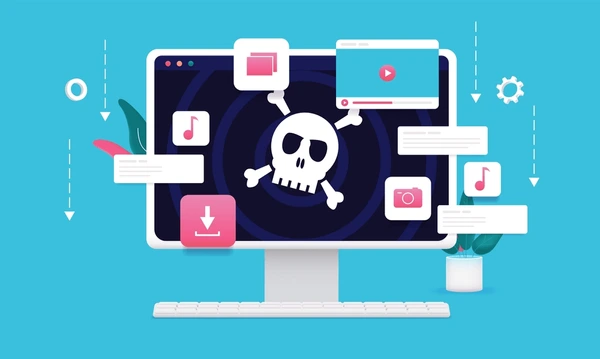Once, watching pirated movies was a moral question of your character. Today, it’s as normal as scrolling through social media. But behind this casual click lies a hidden storm shaking the entertainment world. What if the websites you rely on today disappear tomorrow?
Whether you see piracy as a problem or not, one thing is clear: its rise has sent shockwaves through the global economy. For instance, in 2022, Variety reported that global piracy rates jumped by 18% from the previous year, reaching a staggering 215 billion visits worldwide-more than the Earth’s population. In 2025, an anime piracy website even surpassed Disney+ in monthly global visits, signaling that these platforms might soon rival giants like Netflix. But this explosive growth raises pressing questions about the future of piracy: can governments keep up?
The answer is complicated. While some- like Japan and Germany- have cracked down, threatening jail time for offenders (the creators of pirate sites, not users), just as many countries still have loosely enforced laws. This lack of globally coordinated effort leaves gaps that piracy can easily slip through. Making it stubbornly sustainable.
However, at the same time, countries at the heart of pop culture booms are stepping up their fight. In Japan and South Korea, the surging global demand for anime and K-dramas has made piracy sites a go-to for fans seeking the latest episodes. In response, both countries have ramped up enforcement: Japan is turning to artificial intelligence to police content, while South Korea is working with international agencies like Interpol to shut down foreign piracy sites. The recent closure of Reaper Scans, a major self-translation hub for webtoons and manga, further underscores how serious these efforts have become.
Similarly in the U.S, a new Foreign Anti-Digital Piracy Act was proposed back in January. The act aims to block foreign run pirate sites, and allow copyright holders to obtain site-blocking orders from court. It focuses on targeting large-scale operation of verified pirating sites and the proposal has strong backing from streaming giants like Disney, Netflix, and Sony among others. Yet, even with this backing, there’s concern that such measures could threaten free speech and legitimate websites, showing just how tricky it is to balance enforcement with digital rights.
The Ethical Dilemma
However, despite these overall optimistic efforts, media giants are on their last straw. Not only does piracy eat out of box office and streaming service revenue, it also strains the creative workforce. Animators, for example, suffer greatly as long hours become unsustainable with little pay, and the workforce dwindles, unable to keep up with the demand for new content. Moreover, it costs the global media industry over $70 billion dollars, and is projected to reach $125 billion dollars by 2028 according to a recent estimate by Bytescare. (More statistics below)
- The global movie industry loses around $40 and $97.1 billion annually
- Television industry loses from $39.3 to $95.4 billion annually
- The U.S alone loses $29.2 billion in revenue
Yet the real question lies in the roots of the problem. Why do so many people normalize entertainment piracy in the first place?
The European Union, where the piracy rates continue to shatter their own records, offers some insight. Recent studies about the current economic situation in the Union highlights high unemployment-rate, low-income and high internet accessibility as key players in enhancing the appeal of entertainment piracy. This trend reflects a broader theme: in countries where economic inequalities run high, and entertainment options are limited or expensive, people are more likely to resort to pirated content as an alternative. Simply put, if the underlying conditions of inequality and unemployment are not addressed, then piracy will only rise in popularity.
Which brings to the table, the ethical dilemma of piracy. While illegal and harmful in nature, piracy has also, for a long time, been a form of resistance against censorship and monopolies (ex. Netflix raising subscription prices or North Korea in general). It is civil disobedience, yet it also promotes accessibility to global content, shaping our understanding of the world. It democratises content and allows exposure for underrepresented creators.
In a sense, how else did globalization come to be our reality? It is because for decades, people have been smuggling films and infringing copyright on music. Additionally, with the massive globalization of the 21st century illegal media consumption has risen dramatically. Afterall, if streaming services can go global, why can’t a piracy website?
So, will piracy ever be eliminated in its entirety? The short answer is no, because for as long as the demand for diverse content grows, piracy will be trailing right behind. A victory for some, and a defeat for others.
_______________________________________________________________________________________________
Sources:
https://www.forbes.com/sites/emmawoollacott/2025/02/04/foreign-pirate-sites-could-be-blocked-in-us/
https://www.cbr.com/america-new-piracy-bill-netflix-disney-sony-backing/
Content Piracy in 2025: Prediction, Threats & Strategies | PallyCon
How Does Piracy Affect the Economy? – Bytescare
Piracy Arguments For and Against – Detailed Discussion – Bytescare
https://www.kearney.com/industry/media/article/video-content-piracy-using-the-power-of-data-and-analytics-to-capture-a-multibillion-dollar-opportunity
Global Content Piracy Soared 18% in 2022 (Exclusive) – Variety






























